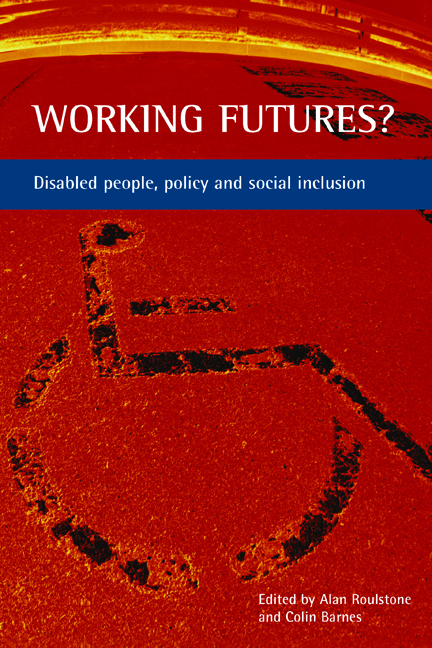Book contents
- Frontmatter
- Contents
- List of figures, tables and boxes
- Preface
- Acknowledgements
- List of abbreviations
- Notes on contributors
- Introduction Working futures: disabled people, employment policy and social inclusion
- Part One Work, welfare and social inclusion: challenges, concepts and questions
- Part Two The current policy environment
- Part Three Towards inclusive policy futures
- Index
- Also available from The Policy Press
twenty one - Disabled people, the state and employment: historical lessons and welfare policy
Published online by Cambridge University Press: 18 January 2022
- Frontmatter
- Contents
- List of figures, tables and boxes
- Preface
- Acknowledgements
- List of abbreviations
- Notes on contributors
- Introduction Working futures: disabled people, employment policy and social inclusion
- Part One Work, welfare and social inclusion: challenges, concepts and questions
- Part Two The current policy environment
- Part Three Towards inclusive policy futures
- Index
- Also available from The Policy Press
Summary
This chapter seeks to show how the social policies of the past have shaped and still inform the current strategies that are being both pursued and proposed in the field of disability, employment and welfare. It focuses on the relationship between the individual the state and the question of employment. The social policy of New Labour can be typified by the proposition that ‘Work is better than welfare’. Since 1997, the welfare-to-work principle and New Deal programme have been applied to young people, lone parents, the long-term unemployed and of course disabled people. This targeted approach to certain sections of the population is in itself novel on the scale it has been pursued, rather than seeing the ‘unemployed’ as an indistinct mass as had been the case since the early 19th century.
What makes this approach possible are arguably structural changes in the labour market and a redefinition from government's point of view regarding who is employable. It shares British social policy’s traditional view of work. This tradition, which has its origins in the 1834 Poor Law Amendment Act and can be traced via the Employment White Paper and the Disabled People's Employment Act (both 1944) to the present day, conceptualises ‘work’ within very narrow margins. Work is equated with wage labouring, nothing more or nothing less.
What is perhaps more enlightening is what it neglects. This discussion will explain how the British social policy tradition has at best failed to understand and at worst ignored the possibility of seeing work in any terms other than income. This approach has implications for disabled people. Paradoxically, this runs in parallel to another tradition, that of ‘citizenship’ within which being in employment and being a legitimate citizen are densely intertwined. This discourse while being fiercely expressed since 1979 in the guise of the ‘property-owning democracy’ in the Thatcher years, and more recently albeit in its softer New Labour form as ‘a stakeholder society’ can again be traced back to 1834. What they hold in common, however, is their conceptualisation of the individual. In policy terms, government has rarely attempted to venture far beyond the ‘factory gates’, and has largely left questions of the economic and social relations of the workplace to employers and workers, or the latter's collective representation via trade unions.
- Type
- Chapter
- Information
- Working Futures?Disabled People, Policy and Social Inclusion, pp. 301 - 314Publisher: Bristol University PressPrint publication year: 2005



